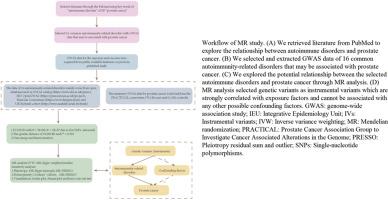Association between autoimmunity-related disorders and prostate cancer: A Mendelian randomization study
IF 2.8
引用次数: 0
Abstract
Background
Although many epidemiological studies and meta-analyses have reported an association between autoimmune disorders and prostate cancer, none has reported a clear correlation or the direction of the association. The purpose of our study was to explore the potential relationship between autoimmunity-related disorders and prostate cancer using Mendelian randomization (MR).
Methods
We retrieved literature from PubMed using the keywords “autoimmune disorder” AND “prostate cancer” to find more clues on the correlation between prostate cancer and autoimmunity-related disorder. Based on this literature search, we selected 16 autoimmunity-related disorders that had genome-wide association study (GWAS) data and may be associated with prostate cancer. The inverse variance weighting (IVW) method was applied as our primary analysis for two-sample MR and multivariate MR analysis to estimate the odds ratio (OR) and 95% confidence interval (CI). We further verified the robustness of our conclusions using a series of sensitivity analyses.
Results
The autoimmunity-related diseases selected include rheumatoid arthritis, ankylosing spondylitis, coxarthrosis, gonarthrosis, Crohn's disease, ulcerative colitis, irritable bowel syndrome, celiac disease, primary sclerosing cholangitis, asthma, type 1 diabetes, systemic lupus erythematosus, multiple sclerosis, autoimmune hyperthyroidism, psoriatic arthropathies, and polymyalgia rheumatica. The results of inverse variance weighting (IVW suggested that six diseases were associated with the development of prostate cancer. The three diseases that may increase the risk of prostate cancer are rheumatoid arthritis (P = 0.001), coxarthrosis (P < 0.001), and gonarthrosis (P = 0.008). The three possible protective factors against prostate cancer are primary sclerosing cholangitis (P = 0.001), autoimmune hyperthyroidism (P = 0.011), and psoriatic arthropathies (P = 0.001). Horizontal pleiotropy was not observed in the MR-Egger test.
Conclusions
Our findings provide predictive genetic evidence for an association between autoimmune disorders and prostate cancer. Further research is needed to explore the underlying mechanisms of comorbidities at the molecular level.

自身免疫相关疾病与前列腺癌之间的关系:孟德尔随机研究
背景尽管许多流行病学研究和荟萃分析报告了自身免疫性疾病与前列腺癌之间的关系,但没有一项研究报告了两者之间的明确相关性或关系的方向。我们使用关键词 "自身免疫性疾病 "和 "前列腺癌 "在PubMed上检索文献,以寻找更多有关前列腺癌与自身免疫性疾病相关的线索。在文献检索的基础上,我们选择了16种有全基因组关联研究(GWAS)数据且可能与前列腺癌相关的自身免疫相关疾病。我们采用反方差加权法(IVW)作为主要分析方法,进行双样本 MR 分析和多变量 MR 分析,以估算几率比(OR)和 95% 置信区间(CI)。我们通过一系列敏感性分析进一步验证了结论的稳健性。结果所选的自身免疫相关疾病包括类风湿性关节炎、强直性脊柱炎、髋关节病、寰枢关节病、克罗恩病、溃疡性结肠炎、肠易激综合征、乳糜泻、原发性硬化性胆管炎、哮喘、1 型糖尿病、系统性红斑狼疮、多发性硬化症、自身免疫性甲状腺功能亢进症、银屑病关节病和多发性风湿痛。逆方差加权(IVW)的结果表明,有六种疾病与前列腺癌的发病有关。可能增加前列腺癌风险的三种疾病是类风湿性关节炎(P = 0.001)、髋关节病(P < 0.001)和膝关节病(P = 0.008)。原发性硬化性胆管炎(P = 0.001)、自身免疫性甲状腺功能亢进症(P = 0.011)和银屑病关节病(P = 0.001)可能是前列腺癌的三个保护因素。我们的研究结果为自身免疫性疾病与前列腺癌之间的关联提供了预测性遗传证据。我们的研究结果为自身免疫性疾病与前列腺癌之间的关联提供了预测性遗传证据。
本文章由计算机程序翻译,如有差异,请以英文原文为准。
求助全文
约1分钟内获得全文
求助全文
来源期刊

Cancer pathogenesis and therapy
Surgery, Radiology and Imaging, Cancer Research, Oncology
CiteScore
0.80
自引率
0.00%
发文量
0
审稿时长
54 days
 求助内容:
求助内容: 应助结果提醒方式:
应助结果提醒方式:


